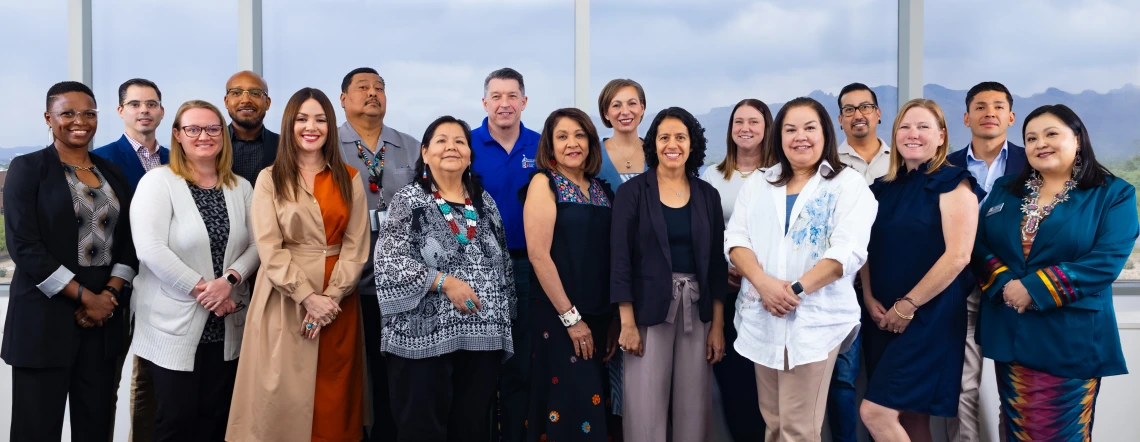Cancer Center-community connection

Welcoming the wisdom of our strong southern Arizona collaborators
When Anna Alonzo's mother was diagnosed with ovarian cancer in the mid ‘70s, the concerned daughter brought her mother from Phoenix to Tucson for treatment under the care of Sidney Salmon, MD, founder of the University of Arizona Cancer Center.
Years later, in 2019, Alonzo received an invitation to join the newly formed University of Arizona Cancer Center Community Advisory Board and is now the CAB chair.
“I remembered how kind and caring Dr. Salmon was to my mom, and the care that she received there at the University of Arizona was just tremendous,” Alonzo said. “It's almost like it came full circle [to work on the board].”
For the Cancer Center, Alonzo and the other 21 CAB members serve as an essential link to the community. They provide center leaders with an equitable and consistent exchange of information, ideas and recommendations about ways to address the cancer burden within the Cancer Center catchment area, which includes Cochise, Pima, Pinal, Santa Cruz, and Yuma counties.
The importance of a community advisory board
“Our Community Advisory Board members play a critical role in evaluating the work of the Cancer Center, from research to outreach, and helping to ensure that this work is impactful for the Arizona communities we serve,” said Monica Yellowhair, PhD, interim associate director of community outreach and engagement and tribal relations in the Cancer Center Office of Community Outreach and Engagement.
The board meets four times a year, and members serve for a three-year term with an opportunity to serve a second term.
CAB members hail from as far as Yuma and Phoenix. Through their diverse geographic regions, ethnicities, and lifestyles, they create a strong group from health-related and community-based organizations, state and local health departments, community hospitals, medical practices and businesses. Several CAB members are cancer survivors, caregivers or even current patients.
Former CAB chair Adalberto Renteria, MD, a founding board member along with Alonzo, assisted in implementing five CAB committees––governance to develop bylaws and recruit members; grants to oversee the Community and Academic Partnership Program (CAPP); assessment to provide important feedback on community assessments and surveys; programs to assess COE outreach programs, events and conferences; and policy, to assist in guiding the policy agenda for the Cancer Center and influence cancer-related policies within the catchment area and beyond.
Renteria also developed a structured interview process that outlines the time commitment and participation requirements for board members.
“As a result, the board over the last two years has been very productive and engaged in dialogue with the University of Arizona administrators to specifically address the needs of the university and the community at large,” he said. “It is a very high functioning workgroup that gets results and creates strategy for the Cancer Center."
The CAB in action
CAB member Brian Hummell, Arizona and New Mexico government relations director for the American Cancer Society, is the chair of the CAB policy committee.
This year, Hummell worked with COE Assistant Director Alejandro Recio Boiles, MD, and center member Charles Hsu, MD, PhD, to publish an opinion editorial providing clinical expertise about heated tobacco products. Dr. Recio-Boiles is an assistant professor at the University of Arizona School of Medicine in the division of Hematology and Medical Oncology of the Department of Medicine, and Dr. Hsu is an associate professor of radiation oncology at the University of Arizona College of Medicine and the medical director of the Cancer Center Clinical Trials Office.
The bill, AZ HB2277, proposed exempting a heated tobacco product known as “heat sticks” from taxation, targeting more price-sensitive consumers, including youth. Recent studies have shown that heated tobacco products contain more than 20 toxic chemicals, including some that can cause cancer.
“My involvement with University of Arizona Cancer Center Community Advisory Board is a really important part of my work,” Hummell said. “To be able to be around other members of the community who are interested in the work of the Cancer Center in a sort of a different way than I am. Most of the people who are involved in the community advisory board are truly members of the community and care about cancer.”
CAB member Mary Gonzalez, a community outreach assistant with University of Arizona Pinal County Cooperative Extension and a diabetes prevention lifestyle, has been on the CAB for a year. She said she enjoys the communication between the Cancer Center and the CAB.
“I feel my main focus as a CAB member is to disseminate and to tie what the U of A Cancer Center is doing to our community in Pinal County,” she said.
“I wanted to serve on the Cancer Center board because it was a great way to share what's happening in the community, from an organizational perspective, with the rest of the Cancer Center,” said CAB member and former co-chair Mindy Griffith, executive director of Bag It in Tucson. “Also, I can make sure the voice of individuals is being heard, and that I share what I'm hearing from patients and caregivers with the Cancer Center.”
CAB member Jonathan Smith, MPH, MA, is a pastor of the Tucson Sharon Seventh-day Adventist Church and doctoral student at the Mel and Enid Zuckerman College of Public Health in health behavior, health promotion, and he is on the CAB grants committee.
“I am so excited when we're in our Cancer Center CAB meetings because we're talking about how we can fund research, how we can engage communities through our community outreach and engagement department and how we can impact the lives of people within our catchment area here in southern Arizona,” Smith said. “That's making an impact in lives of people who are at high risk who may be low on that socioeconomic status scale, and we're able to give them some of the best research and opportunities to take advantage of the advancements in cancer treatment. That is exciting.”



